Recent Fire Damage Posts
When to Change Smoke Alarm Batteries
11/20/2023 (Permalink)
Smoke alarms are essential devices that provide early warning of potential fires in our homes. To ensure their reliable operation, it is crucial to regularly maintain and replace the batteries. But
how often should you change smoke alarm batteries? In this blog post, we will discuss the importance of maintaining functional batteries in smoke alarms and provide guidelines on when to replace them, allowing you to maintain optimal fire safety in your home.
Follow Manufacturer Recommendations
The first step in determining when to change smoke alarm batteries is to refer to the manufacturer's instructions. Different smoke alarm models may have specific recommendations regarding battery replacement. These instructions typically include information on battery types, lifespan, and replacement intervals. Familiarize yourself with these guidelines to ensure you are following the manufacturer's recommendations for your particular smoke alarm.
Replace Batteries Annually
As a general rule of thumb, it is advisable to replace smoke alarm batteries at least once a year. A good practice is to select a specific date, such as when you change your clocks for daylight saving time, to serve as a reminder to replace the batteries in all your smoke alarms. By doing this annually, you can maintain the reliability of your smoke alarms and minimize the risk of battery failure.
Test Smoke Alarms Regularly
Apart from annual battery replacement, it is important to test your smoke alarms on a regular basis to ensure they are functioning correctly. Most smoke alarms have a test button that allows you to check if the alarm sounds properly. Ideally, you should test your smoke alarms once a month. If the alarm does not sound when tested, replace the battery immediately.
Consider Long-Life Batteries
In addition to traditional disposable batteries, consider using long-life or lithium batteries in your smoke alarms. Long-life batteries typically have a lifespan of up to 10 years, eliminating the need for annual battery replacements. However, it is still crucial to test these smoke alarms regularly to ensure they are functioning correctly.
If your smoke alarm emits a low-battery warning beep, replace the batteries promptly. Do not ignore or disable the warning sound, as it is a vital reminder that the batteries need to be changed. Delaying battery replacement increases the risk of the smoke alarm failing to function during an emergency, jeopardizing the safety of your household.
If a smoke alarm frequently gives false alarms or malfunctions, even after replacing the batteries, it may be time to replace the entire unit.
If the smoke alarm is more than 10 years old, consider replacing it with a new model, as older units may not meet current safety standards.
Maintaining functional batteries in your smoke alarms is crucial for reliable fire safety in your home. By following the manufacturer's recommendations, replacing batteries annually, testing smoke alarms regularly, and promptly addressing low-battery warnings, you can ensure that your smoke alarms are in optimal working condition. By prioritizing the maintenance of your smoke alarms, you are taking proactive steps to protect yourself, your loved ones, and your home from the devastating effects of fires.
Beeping, Aging, and Extreme Conditions: When to Change Your Smoke Alarm Batteries
4/4/2023 (Permalink)
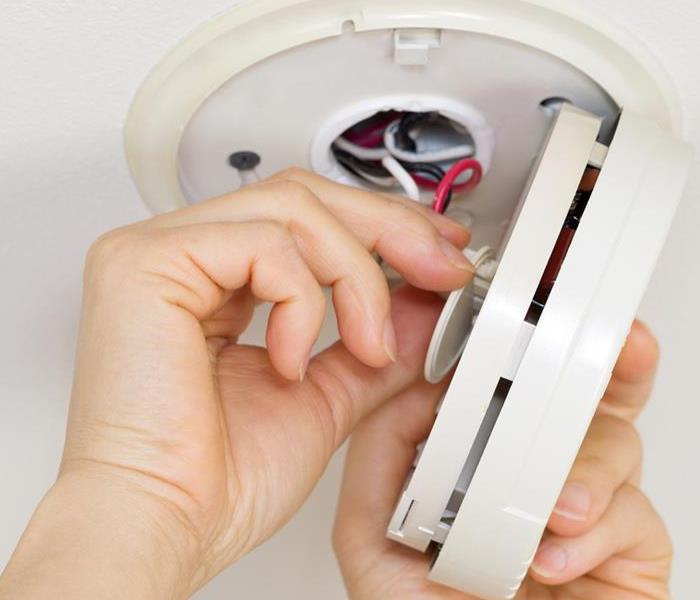 Changing your smoke alarm batteries is a crucial part if ensuring your home is safe incase of a fire.
Changing your smoke alarm batteries is a crucial part if ensuring your home is safe incase of a fire.
Smoke alarms are one of the most important safety features in a home, providing early warning of a fire and allowing residents to evacuate quickly and safely. However, in order for smoke alarms to do their job effectively, they need to be properly maintained and the batteries need to be changed regularly. So, when should you change your smoke alarm batteries?
The National Fire Protection Association (NFPA) recommends that smoke alarms be tested monthly and that the batteries be replaced at least once a year. This is a good rule of thumb, but there are some other factors to consider as well.
First, if your smoke alarm starts beeping, it is likely an indication that the battery is low and needs to be replaced. This can be an annoying sound, but it is an important reminder that your smoke alarm needs attention.
Another factor to consider is the age of your smoke alarm. Most smoke alarms have a lifespan of about 10 years, after which they should be replaced. If your smoke alarm is getting up there in age, it may be a good idea to replace it entirely, rather than just changing the batteries.
If you live in an area with extreme temperatures or high humidity, you may need to change your smoke alarm batteries more frequently. These conditions can cause the batteries to wear out more quickly, so it's important to keep an eye on them and replace them as needed.
It's also a good idea to change your smoke alarm batteries if you are going to be away from home for an extended period of time. This is especially important if you will be away during a time when the weather is likely to be extreme, as your smoke alarms may need to work harder to detect smoke or fire in these conditions.
Finally, it's important to make sure that your smoke alarms are working properly at all times. This means testing them monthly, as recommended by the NFPA, and making sure that they are installed in the right locations. Smoke alarms should be installed on every level of your home, as well as outside each sleeping area and in every bedroom.
In conclusion, changing your smoke alarm batteries is a crucial part of maintaining the safety of your home. By following the recommendations of the NFPA, testing your smoke alarms regularly, and paying attention to the age and condition of your smoke alarms, you can help ensure that your home and your family are protected in the event of a fire.
Four common causes in Kitchen Fires
2/20/2023 (Permalink)
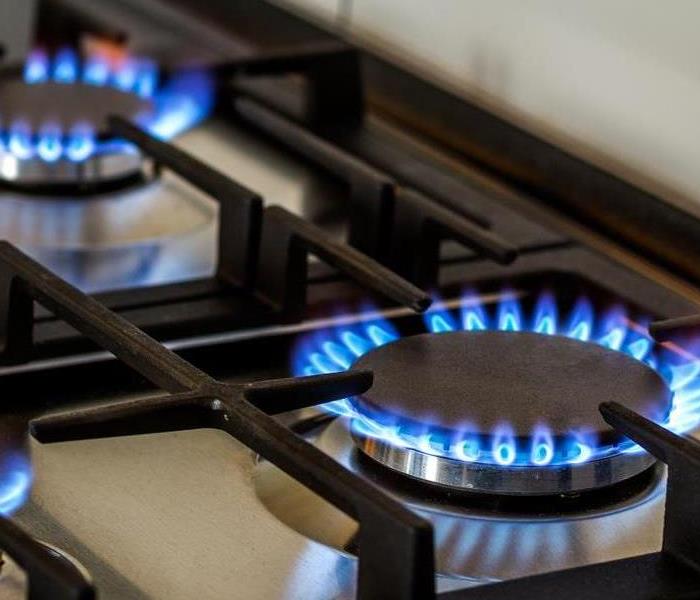 Cooking and grease can be top causes for a kitchen fire.
Cooking and grease can be top causes for a kitchen fire.
Kitchen fires are a common cause of home fires. It is important that you take precautionary measures to protect your home and family from these dangerous events.
Cooking
Cooking is the most common cause of kitchen fires, with 60% of all kitchen fire incidents starting in the kitchen.Never leave cooking unattended, even for a brief moment. Always check your food and be aware that grease can catch on fire easily, if left unattended on the stovetop or in the oven. If you're using an electric appliance near water or near other heat sources (such as toasters, air fryers, etc.), be sure to unplug it before leaving it unattended or placing something else on top of it.
Heating
Heating appliances are a common cause of fires in the kitchen. This includes:
- Radiators
- Space heaters
- Fireplace logs and wood stoves/inserts
In addition to these, you should also be careful with candles and other flammable materials that may come into contact with your countertop appliances.
Electrical and appliances
Electrical and appliance fires are the second leading cause of kitchen fires, accounting for 30% of all residential fires. These can be caused by faulty wiring, overloaded circuits, or broken or frayed wires. The most common culprits are hair dryers and toasters (which have been known to spark up when plugged into an outlet). You may also consider checking your appliances' safety features before you use them. If there's a problem with the cord, for example frayed electrical cord or cut, you should replace it immediately before you end up with a dangerous fire.
Fat and grease fires are responsible for the most fires overall.
Fat and grease fires are responsible for the most fires overall, according to the National Fire Protection Association. They're also the most common cause of kitchen fires—and they can be difficult to put out without proper training and equipment.
The first thing you should know about fat and grease fires is that they are caused by overheated oil or fat coming into contact with an ignition source like a flame or electrical spark. If you use your stovetop griddle often, keep in mind that even a small amount of oil can quickly become flammable as it heats up on its own or when it comes into contact with another hot surface like an electric burner or flame from a match or lighter. If a fire does break out in your kitchen, don't try to smother it with water—this could send burning oil onto other surfaces around the room. Instead, shut off any heat sources nearby (like gas burners) and immediately move away from them before calling 911 for help.
Kitchen fires are a real concern, and it's important to be aware of the causes so that you can take steps to prevent them. By taking action now, we can all feel safer in our homes.
A fast response and availability 24 hours a day.
Fire damage is one of the most common reasons for homeowners to call a restoration company. When a fire takes place, it can cause water damage. If you're not sure how to deal with a fire or water damage situation on your own, then it's best to call in professionals who have experience dealing with these situations.
As Fire Damage professionals, we are available 24/7 and will help you restore your home as quickly as possible so that you can get back to normal life again!
Does Homeowner Insurance Cover Wildfires Damages To My Property?
1/19/2023 (Permalink)
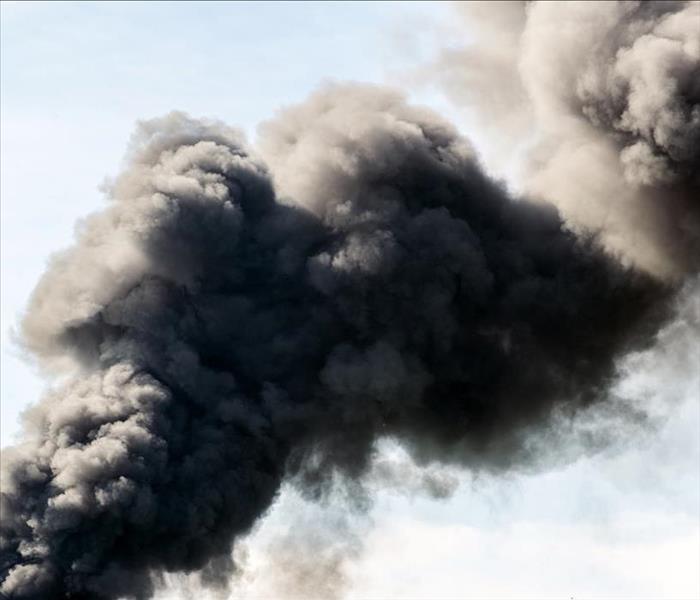 It’s so important to have a trusted restoration company like SERVPRO on your side handling cleanup and repairs after a wildfire has damaged your home.
It’s so important to have a trusted restoration company like SERVPRO on your side handling cleanup and repairs after a wildfire has damaged your home.
Wildfires are some of the most destructive natural disasters that can happen to a homeowner. They can threaten not only your property but also your life and the lives of others. If you live in a region where wildfires occur, it’s important to know what steps you should take to protect yourself from these destructive threats.
What Steps Must I Take to Purchase Wildfire Insurance?
To ensure that you are prepared for the upcoming wildfire season, take these steps:
Contact your insurance agent. Your homeowner's insurance agent can help determine if your policy covers wildfire damage and provide a quote to cover additional coverage. Some agents will require that you contact them at least 30 days before the start of the fire season in order to receive discounted rates.
If you already have homeowner's insurance and live in an area prone to wildfires, it is important for you to read through your policy so that you know exactly what kind of coverage comes with it and how much money would be required out of pocket should a fire occur on or near your property. Take note of any exclusions listed in your policy as well as any restrictions on additional perils coverage (i.e., earthquake, flood).
What Could Be Included In Coverage for Wildfire Damage?
- Damage to property. The most common type of claim homeowners face after a wildfire is for damage to their homes, whether it's a home under construction or an existing structure. Damages that may be covered include:
- Loss of personal property. If you can't access your home because the fire is too hot, then there's a chance that your valuables will be damaged as well. This includes electronics, clothing, and other personal items that weren't protected by water-resistant bags or containers. Some policies will cover these losses up to $1,500 while others will cover them up to $3,000 - check with your provider about how much they'll pay out before signing up for their plan!
Do Wildfire-Related Damages Get Covered by Renters Insurance?
Your renter's insurance policy covers the contents of your Bel Air, CA home, but not the structure itself. If a wildfire destroyed your rental property, it would not be covered by this specific type of insurance.
However, you should check with your provider to see if there are any exceptions to this rule. Many companies will cover some types of damages caused by natural disasters such as wildfires or floods at no additional cost to you.
If none is available and you still want coverage for those situations, keep in mind that additional coverage may be necessary for certain situations.
Importance of Having a Trusted Restoration Company by Your Side
If you live in an area that has been affected by a wildfire and your home was damaged, it’s important to have a trusted restoration company like SERVPRO of Bel Air/ West Hollywood on your side handling cleanup and repairs after a wildfire has damaged your home.
They can help you get back on your feet quickly and will work with you every step of the way. They can take care of any insurance issues for you and they’ll make sure that the claim process goes smoothly so there aren't any surprises at the end of everything.
They are experts at what they do; so if anything goes wrong or needs repairing after a fire breaks out in your neighborhood, then this is definitely who should be called!
Wildfires are unpredictable and dangerous, but they don’t have to destroy your home. That’s why it’s so important to have a trusted restoration company like SERVPRO on your side handling cleanup and repairs after a wildfire has damaged your home.
How Can Renters Insurance Help After a Fire?
8/31/2022 (Permalink)
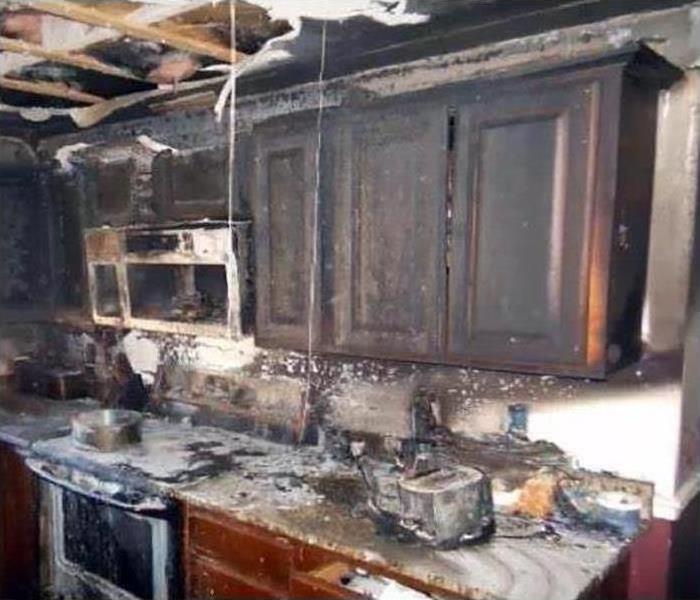 A kitchen fire in Melrose District, CA
A kitchen fire in Melrose District, CA
Ways Your Renters Policy Can Work For You After A Home Fire Incident
One common misconception many renters have is the belief that they do not need an insurance policy. While renters aren't responsible for homeowners insurance, a renters insurance policy can go a long way after an accident, particularly after a fire. See the many ways your renters policy can work for you after a home fire incident.
Replacement Costs for Personal Property
One of the most common expenses to renters after a home fire is the cost of replacing personal property. If your personal belongings receive fire damage or are destroyed in a residential fire, an insurance policy for renters can be highly helpful. Rental insurance assists with the cost of replacing goods at current purchase value. This is good news if you have lost items to a fire that have depreciated over time. While your old TV or dining room set may not have much cash value if you were to put them up for sale, the replacement value of those items is the amount you would be likely to spend to replace them. Personal belongings commonly replaced by a renters policy include the following:
- Couches
- Tables and Chairs
- Electronics
- Bedding
- Clothing
- Appliances
Injury and Liability
If you are responsible for starting a fire by your own negligence, renters insurance may be helpful for covering medical costs for those hurt by the fire. For example, if a fire started at your residence causes smoke damage to neighboring tenants, liability costs may be covered or offset by your insurance policy. Each renters policy is unique. Talk to your insurance provider directly to understand the injury and liability coverage available in your plan.
Loss of Use Clause
Finally, an insurance policy for renters may assist you with loss of use. This means, if your dwelling becomes unlivable after a fire, renters insurance may kick-in to pay for the costs of lodging. Lodging expenses may include temporary housing or hotels while a Melrose District, CA, fire restoration expert cleans up the aftermath. Make sure you have a good insurance policy in place before a fire strikes so that you, as a renter, will be protected.
Protect Your Home With the Right Smoke Alarms
6/6/2022 (Permalink)
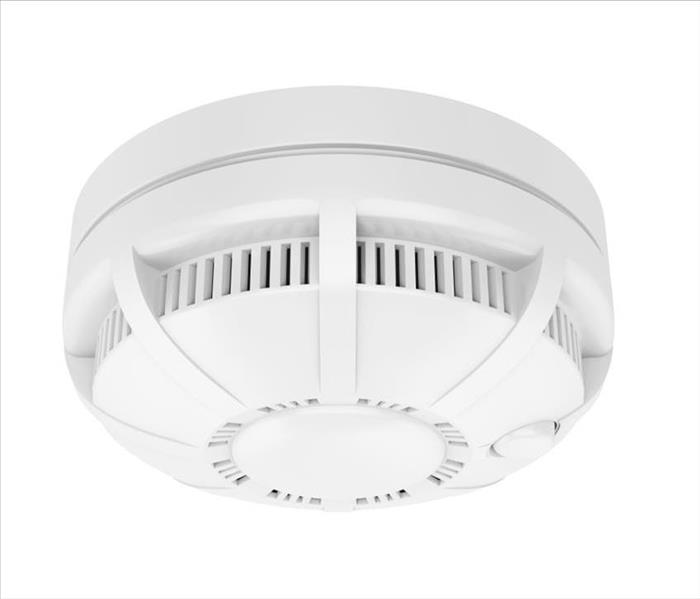 The ionization alarm is one of the more common and affordable options.
The ionization alarm is one of the more common and affordable options.
Invest in the Right Smoke Alarms for Your Home
A smoke alarm is a crucial part of your Spaulding Square, CA, home's fire safety plan. It can detect a fire immediately so you can try extinguishing it before it grows or safely evacuates the house and call the fire department. Since there are several alarm types that operate differently and fulfill distinct functions, you will need to learn about them so that you can choose the right one.
1. Ionization Alarm
The ionization alarm is one of the more common and affordable options. Every device includes a small portion of radioactive material that ionizes the present air particles, an act that generates an electric current. The presence of smoke disrupts the current and activates the alarm. Unfortunately, it can also trigger false alarms in kitchens and bathrooms, so avoid installation in those areas. Ionization alarms are best suited for detecting visible flames and fast fires anywhere else in the house.
2. Photoelectric Alarm
The photoelectric smoke alarm includes both a photosensitive cell and a built-in light source that avoids the cell. When smoke enters the alarm, the light's straight focus breaks and hits the cell. This reaction activates both the cell and the alarm. Unlike the ionization counterpart, the photoelectric alarm best detects smoky and smoldering fires. Be sure to install it near kitchens, bathrooms and areas where these fires would be more common.
3. Combination Smoke Detector
Since ionization and photoelectric detectors work for different types of fires, it makes sense to unite their functions. A combination alarm, also known as a dual-sensor alarm, combines both technologies into one convenient device that you can place anywhere as it can cover most situations. Some combination alarms can include other functions such as carbon monoxide detection, intelligent systems that improve performance and voiced alerts.
Choosing the appropriate smoke alarm for every room and hallway at home can make a difference. If it effectively detects a fire, you can escape in time and contact emergency services and fire restoration experts before the situation escalates.
How To Prevent Grill Fires
5/25/2022 (Permalink)
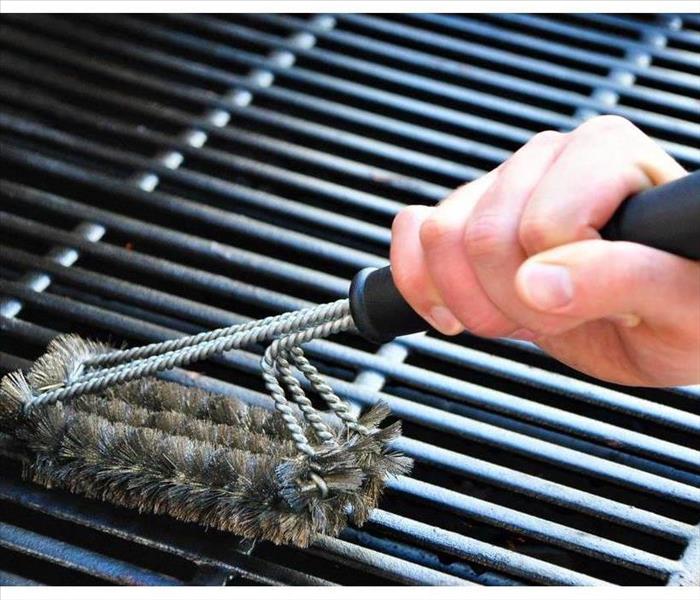 Clean your grill frequently.
Clean your grill frequently.
How To Prevent a Barbeque Fire
Grilling is a fun activity that brings families and friends together to enjoy great food and time outside. If you aren't careful, however, a grill fire may occur, potentially causing injuries and smoke damage. Here's how you can prevent a barbeque fire.
Know-How To Put Out a Fire
Knowing how to put a fire out and having the right supplies on hand is just as important as preventing fires. Here are some tips:
- If the propane tank is on fire, get as far away as you can and call the fire department.
- Cut off oxygen by closing the grill's lid.
- Turn the grill off if possible.
- If the fire does not stop, spray it with a fire extinguisher or cover it with baking soda to cut off the oxygen.
After the fire is extinguished, call a fire damage repair service in Central Hollywood, CA, to repair any damage that might have affected nearby buildings.
Choose a Safe Location
To prevent fires from spreading to your home, operate the grill at a safe distance away from the building. Avoid grilling on a balcony, patio, deck, or other areas that are close to your house. Instead, position the grill in a clear area of your yard.
Clean the Grill Frequently
Burnt remnants on the grill can catch fire easily. After you are done grilling, allow the grill to fully cool and then thoroughly clean it. Always check that it is clean before turning it on.
Trim the Fat
While some fat on your meat is a good thing, excess fat can be a fire hazard. These fatty areas catch fire easily, causing flare-ups that can turn into a fire if you aren't careful. Trimming away excess fat can help reduce this risk. You can also keep a spray bottle of water near the grill to put out small flare-ups, but never pour large amounts of water onto a grill fire.
It's easy to prevent grill fires by grilling far from the building, cleaning the grill frequently and trimming excess fat. You should also know how to put out a barbeque fire in case one occurs.
Using the P.A.S.S. Technique
3/19/2022 (Permalink)
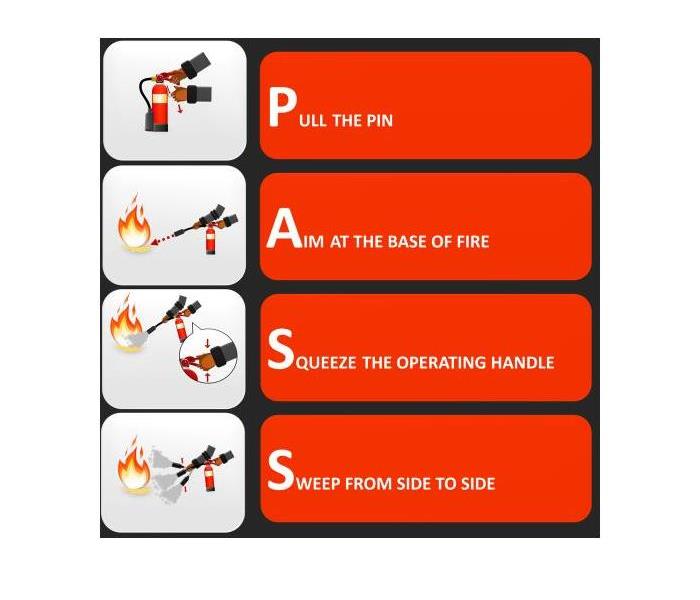 Do not use another fire extinguisher and start the P.A.S.S. process over.
Do not use another fire extinguisher and start the P.A.S.S. process over.
How To Use a Fire Extinguisher
In order to comply with state and local codes, you are probably required to have a fire extinguisher in several places throughout your building in Melrose District, CA. A tool is only helpful, however, if the people who need to use it know how to do so effectively. It's a good idea to train your employees periodically on how to use the extinguisher to keep small fires from becoming large ones that do a lot of expensive damage. After assessing the situation, the simple acronym "P.A.S.S." can help.
Assess
Any time there is a fire, a quick assessment of the situation is the key to handling it effectively so that it causes as little fire damage as possible. The checklist should include:
- Contacting the fire department
- Getting people out of the area or building
- Identifying a way to escape if efforts with the extinguisher don't put the fire out
Pull
There is a pin at the top of the fire extinguisher. When this pin is removed, it unlocks the extinguisher by breaking the seal and this allows the apparatus to be used. Pull the pin.
Aim
Point the nozzle of the extinguisher at the base of the fire. For example, if there is a kitchen fire on the stove in your break room, aim at the lowest point. This targets the fire at its source.
Squeeze
Put the hand that is not directing the hose on the handle at the top of the extinguisher. Squeeze it to release the dampening agent.
Sweep
While the agent is releasing, move the spray back and forth along the base of the fire. Continue to do so until the fire is out.
If all the extinguishing agent is gone and the fire is still not out, do not use another fire extinguisher and start the P.A.S.S. process over. Evacuate according to plan and let the fire department handle it from there. Knowing how to use the extinguisher may keep your bill for fire restoration services lower.
What To Do If You Suspect Natural Gas
2/1/2022 (Permalink)
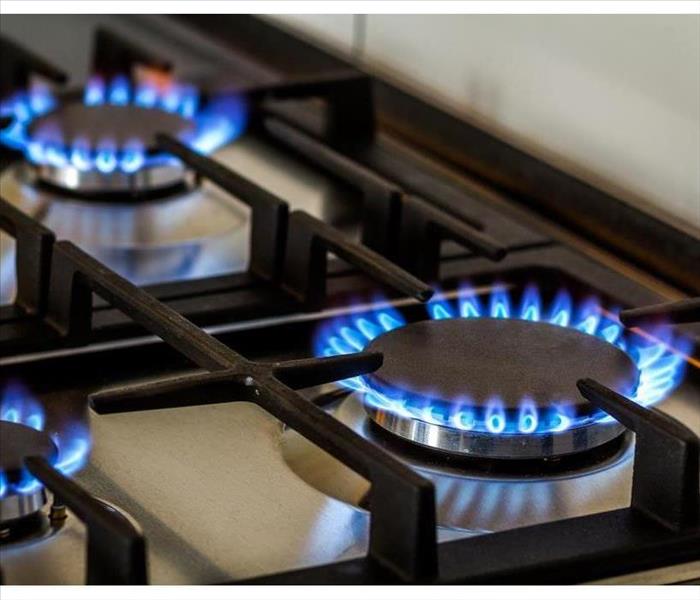 Avoid a gas fire or explosion in your Weho, CA, home.
Avoid a gas fire or explosion in your Weho, CA, home.
How To Stay Safe If You Suspect a Gas Leak
They're sometimes hard to recognize, but it doesn't take much of a leak to cause a gas fire. These home disasters are all too common. Fortunately, you can avoid a fire or worse by recognizing signs of a leak:
- A hissing or whistling sound near the line
- The smell of rotten eggs or sulfur
- Bubbles in the water
- Dead houseplants
- Visible dust near the gas line
- Damage to the gas pipe
Family members or pets may show signs of a natural gas leak, as well. These may include nosebleeds, reduced appetites, nausea, mood changes, irritation to the eyes and throats, disorientation, and breathing difficulties.
Keep Your Family and Home Safe
Avoid a gas fire or explosion in your Weho, CA, home by following these top tips:
1. Check Gas Stoves
If you have a gas stove, the dials may have been turned on or left on accidentally. If you're confident it's safe to remain in your home, move to the stove and turn off any flames.
2. Do Not Flip Switches
Simply flipping the light switch to on or off could make a spark that causes a gas explosion. Instead, use a flashlight for any other actions you take in the house. Don't use the phone inside the house, either. In fact, don't use lighters, candles, or anything else that could ignite.
3. Ventilate the Home
Open all the windows and doors, so fresh air can come in and gas will move out of the house. Don't worry about taking any steps further than this. Instead, wait to contact emergency or fire remediation professionals when you and your family are safely outside.
4. Go Outside
Get everyone outside and go across the street. From this safe distance, call 911 or the appropriate authorities.
Learn as much as you can about what may cause a gas fire and how to avoid them to keep your family safe. Teach your family about natural gas and how to stay safe if they suspect a gas leak.





 24/7 Emergency Service
24/7 Emergency Service







